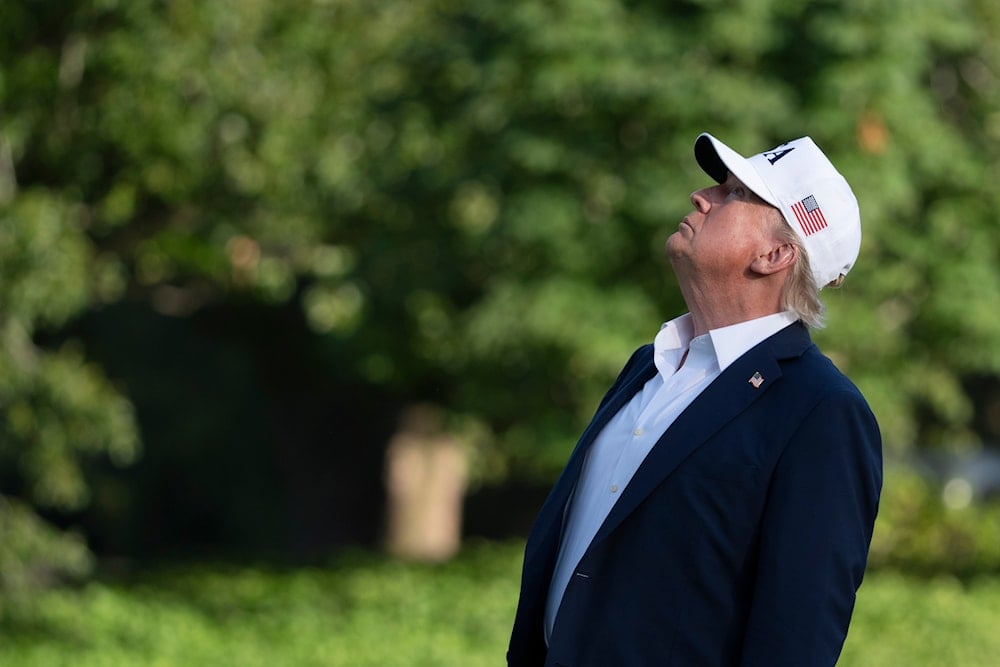Trump backs Russia sanctions, contingent on expanded president control
US President Donald Trump shows openness to a GOP-led Russia sanctions bill but demands expanded waiver authority, amid disagreement among congressmen.
-

President Donald Trump looks up at the American flag on the flagpole on the South Lawn as he arrives at the White House, Sunday, July 6, 2025, in Washington. (AP)
US President Donald Trump is willing to sign a harsh Russia sanctions bill pushed by GOP hawks but only with changes that give him more power over it.
A senior administration official, speaking anonymously to POLITICO, indicated that while there is "conceptual openness" to Senator Lindsey Graham’s bill, the White House believes the legislation must maintain what it views as the president’s exclusive authority to direct US foreign policy.
The current version of the legislation permits the president to suspend a 500 percent tariff on nations purchasing Russian oil and uranium for a maximum of 180 days, and Graham stated on Tuesday that he has consented to amend the bill to include a potential second waiver, though this extension would require congressional approval.
The administration's proposed modifications would reinforce the president's waiver authority, preventing Congress from challenging Trump if he chooses to lift the sanctions.
“The current version would subject the president’s foreign policy decisions to micromanagement by Congress through a joint resolution of disapproval process. … That’s a nonstarter for us,” the US official told POLITICO, adding that “the administration is not going to be micromanaged by the Congress on the president’s foreign policy. The bill needs a waiver authority that is complete.”
Frustration with Putin influencing Trump
Trump's increased openness to working with Congress on the sanctions legislation reflects his mounting dissatisfaction with Russian President Vladimir Putin, whom he accuses of rejecting attempts to broker a ceasefire in Ukraine's war.
“For the president now, he has invested his own reputation of being able to negotiate anything anywhere, and Putin has made him look foolish,” a Republican operative close to the White House told POLITICO.
Trump stated Tuesday that Putin was directing "a lot of bulls***" his way" while revealing he was "looking very strongly" at the sanctions legislation, followed by Speaker Mike Johnson endorsing the sanctions effort on Wednesday.
The president's remarks, stressing that any further sanctions against Russia would only be implemented "at my option", highlighted what his aides describe as his foremost objective, preserving complete authority and unrestricted flexibility in shaping US policy toward the Kremlin.
GOP divided over presidential powers
Two sources speaking anonymously about confidential Capitol Hill negotiations confirmed that although the White House may generally back the sanctions legislation, disagreements persist with congressional leaders regarding the extent of the president's waiver powers.
POLITICO highlighted that the Republican-led Congress has shown notable compliance with Trump's demands thus far. Given this precedent, the administration anticipates that legislators will shape the Russia sanctions legislation to meet the president's preferences, even if doing so requires relinquishing their oversight of its implementation.
Beyond his goal of limiting congressional oversight on foreign policy decisions, Trump's push for flexibility stems equally from maintaining the possibility of a future diplomatic breakthrough with Putin, according to the two White House officials.
On Wednesday, Senator Lindsey Graham reaffirmed his belief that Trump supports his legislation, explaining that the president has secured the waiver authority he sought and maintains full control over sanction implementation. He noted that Trump had expressed that the bill could prove useful during their discussions and emphasized their shared goal of strengthening the president's negotiating leverage through this collaborative effort.
The bill has strong bipartisan support in the Senate with more than 80 co-sponsors, meaning it could theoretically survive a Trump veto, yet many Republicans remain reluctant to move forward with it until they receive clear and unequivocal support from the president himself.
Putin unfazed by Trump's threats
Meanwhile, The New York Times reported that Russian President Vladimir Putin remains "unswayed by words" from his American counterpart, Donald Trump, citing two sources close to the Kremlin who indicated Putin believes Russia's battlefield advantage over Ukraine continues to grow while Ukrainian defenses may collapse in coming months.
The sources explained that Putin had "anticipated Trump's impatience," recognizing that the US president might eventually impose new sanctions, particularly after Washington went six months without levying any new penalties against Moscow related to the war in Ukraine.
In the same context, the NYT quoted Tatiana Stanovaya, a senior researcher at the Carnegie Russia Eurasia Center, who emphasized that Putin "will not sacrifice his objectives in Ukraine just to improve relations with Trump."
“Putin really values and is investing in a personal relationship with Trump, but at the same time, he never had any illusions about how American policy toward Russia might develop. And the Russian leadership has always prepared for the worst.” Stanovaya stated, emphasizing that Moscow was always prepared for the worst.
US weapons deliveries were never officially suspended: US official
In a related context, a senior White House official stated Wednesday that Trump had approved certain Ukrainian military aid requests following a specific list provided by President Volodymyr Zelensky during their meeting in The Hague last month, The Washington Post reported.
However, the senior White House official clarified on Wednesday that the weapons deliveries had never been officially suspended and that assistance to Ukraine remains ongoing.
A senior defense official, speaking anonymously due to the sensitive nature of the matter, revealed Wednesday that the Pentagon's review of weapons deliveries to Ukraine was initiated in June after Hegseth authorized a memo following discussions with White House staff and other Defense Department leaders, including Elbridge Colby, the undersecretary of defense for policy.
The official stated that at NATO, the Ukrainians "were asking for very specific things, and the president granted some of those things," while choosing not to provide details about which particular weapons systems received approval.

 6 Min Read
6 Min Read











